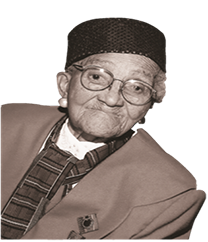 As a respected activist, journalist and lifelong educator, Rosa Lee Jones was a trailblazer in her community of Cocoa, Florida. Rosa Lee Campbell Jones was born on February 26, 1907, in Quincy, Florida but she spent most of her life in Cocoa. Rosa L. Jones possessed a lifelong love of education. In 1922, she graduated from FAMC High School, now known as Florida Agricultural and Mechanical University (FAMU). Jones graduated with honors from Walker’s Business School in Tampa, where she earned a business degree. She also attended Brevard Community College in Cocoa, where she became a kindergarten teacher.
As a respected activist, journalist and lifelong educator, Rosa Lee Jones was a trailblazer in her community of Cocoa, Florida. Rosa Lee Campbell Jones was born on February 26, 1907, in Quincy, Florida but she spent most of her life in Cocoa. Rosa L. Jones possessed a lifelong love of education. In 1922, she graduated from FAMC High School, now known as Florida Agricultural and Mechanical University (FAMU). Jones graduated with honors from Walker’s Business School in Tampa, where she earned a business degree. She also attended Brevard Community College in Cocoa, where she became a kindergarten teacher.
At the age of 19, she moved to Cocoa and married Osborne Herman Jones. Rosa and Osborne Jones had three children, the late Robert Eugene Jones, Annie Laura Collins, and Rebecca Baker, and 11 grandchildren and 22 great-grandchildren.
A Voice for the Community
Rosa L. Jones served as a contributing editor for Cocoa’s two black newspapers, The Script, and The Brevard, which kept the community informed of important issues and social happenings. She also worked as a ghost writer of speeches for local leaders and dignitaries.
Her love of community building jumped from the page to the airwaves, where she was a popular radio personality for WKKO-AM’s Sunday morning “Open House” program on Pluckebaum Road in Cocoa. Her “The Gab Bag” segment announcing special events and occasions in the community. Jones was also the first black Girl Scout leader in Cocoa.
Rosa L. Jones the Activist
Jones served as the secretary for civil rights martyr Harry T. Moore and helped Moore organize the first NAACP chapter in Brevard County. An educated black woman in a time when few had the opportunity to complete college, Jones befriended fellow educator Harry T. Moore, who was teaching fourth grade in Cocoa’s only all-black elementary school. In 1934, Moore teamed up with Jones as his secretary to establish the first NAACP chapter in Brevard County. Their work together rallied the education community, registered black Floridians to vote, and ignited a movement.
In 1937, in conjunction with the all-black Florida State Teacher’s Association, and backed by NAACP attorney Thurgood Marshall in New York, Moore filed the first lawsuit in the Deep South to equalize black and white teacher salaries. Although the case was eventually lost in state court, it spawned other federal lawsuits in Florida that led to equal pay. Due to his political activism, Moore was soon fired from his teaching job but continued growing membership in statewide chapters of the NAACP.
Cries for civil rights grew louder, especially in the aftermath of the national scandal of the Groveland rape case of July 1949, when four young black men were wrongly accused of raping a white woman. Moore publicly protested the handling of the case, which may have been the catalyst for his murder in 1951. The Moores were asleep on Christmas night when a bomb was placed beneath the floor joists of their home. Moore was the first NAACP official killed in the Civil Rights Movement.
Rosa L. Jones the Educator
In the 1960s, Rosa L. Jones and her husband Osborne mortgaged their home to build Rosebud Kindergarten and Child Care Center. Jones was the first African American woman to own and operate a licensed kindergarten and day care center. Among her students were notable figures in local government and the education field.
Rosa L. Jones passed away in 2008 at the age of 101 years old. Throughout her life, her love for her community shone through her words and deeds. On the radio, in print, in speeches, in school lectures, and in person, she inspired others to achieve success in life.



